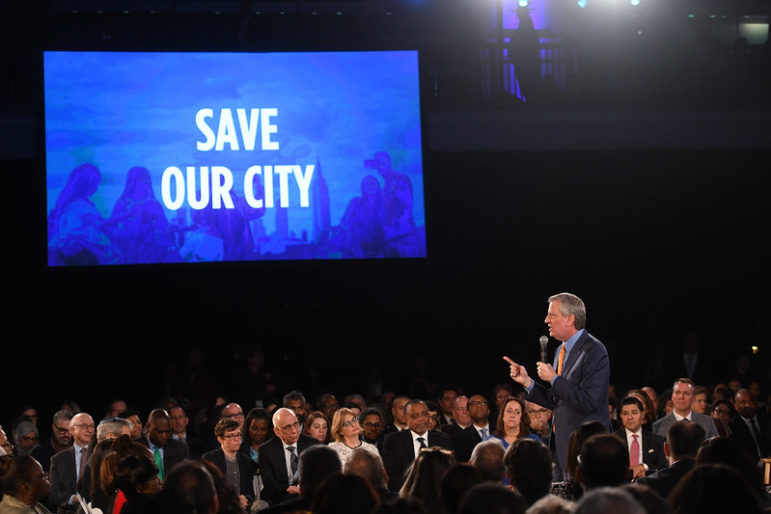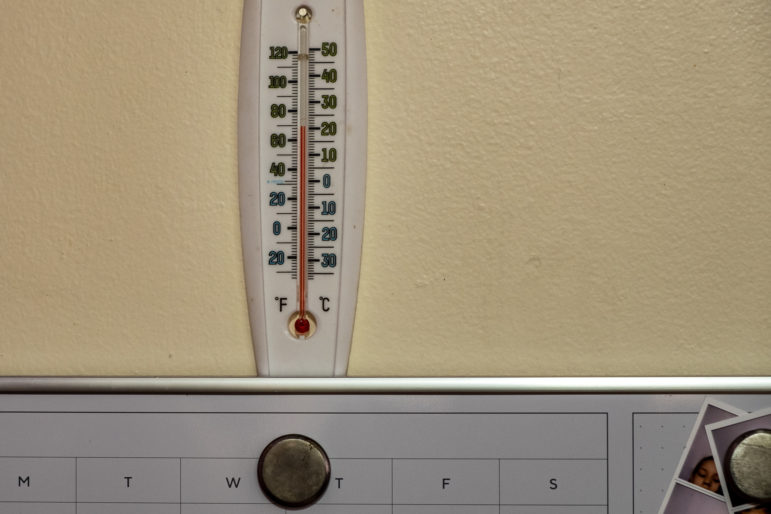
Michael Appleton/Mayoral Photography Office
Mayor Bill de Blasio delivers his seventh State of the City address at the American Museum of Natural History on Thursday, February 6, 2020.Mayor Bill de Blasio gave this year’s State of the City address and released a blueprint to, what he called, “Save Our City.” Yet there is a pattern of failure within the de Blasio administration to meaningfully engage with communities striving to do just that, especially in neighborhoods targeted for rezoning efforts. In December, a Manhattan Supreme Court judge brought an Inwood rezoning plan to a halt when the city failed to take a “hard look” at how regulating land use would impact the neighborhood.
The city continues to set a precedent of callous disregard for community concerns. In a move insulting to community leaders and people who call Bushwick home, the Mayor’s Office declined to even study the impacts of the Bushwick Community Plan— a collaborative rezoning plan of local residents, community groups, elected officials and city agencies six years in the making.
The city made progress by working in tandem with the community to build out the plan but fell short of flipping the script on how they deal with community-based proposals. Instead, they pulled the rug out from under the hundreds of volunteers who participated in establishing a new model of community-led planning by failing to take even the first step in studying the plan.
Mayor de Blasio’s administration has an opportunity to alter a historical narrative of snubbing community priorities and reclaim the privilege of representing the people. Study the comprehensive plan put forth by Bushwick community members, acknowledge the broader priorities that the city needs to ensure sustainable growth, and consider how the people’s ideas will complement and strengthen their own plan.
Deputy Mayor Vicki Been mischaracterized the Bushwick Community Plan’s approach as “fundamentally a downzoning.” To be sure, the plan does advocate for restricting height on residential streets to preserve Bushwick’s historic character. But it also uses the city’s own framework to call for the building of thousands of much-needed new affordable apartments.
In a neighborhood where the median household income in 2017 was $51,622—about 17 percent less than the citywide median, and the poverty rate was 27 percent, compared to 18 percent citywide, gentrification has arrived in a fury. As of November 2019, the median asking rent for Bushwick was $2,750/month, and 51 percent of Bushwick residents are paying more than 30 percent of their income on rent.
As heads of RiseBoro Community Partnership and the Brooklyn Community Board 4, two of the 11 local organizations who helped craft the community plan’s recommendations, it is evident that the proposal is far more complex and comprehensive than one solely focused on zoning. It is aimed at protecting and preserving a neighborhood in the throes of gentrification, disruption and displacement. The community-driven proposal is a thoughtful look at all the resources Bushwick needs to thrive now and in the future, including transportation infrastructure, open space, economic development, and community services.
Characterizing the plan as “essentially a downzoning” is disingenuous and ignores the comprehensive needs of our community. And disagreeing with one aspect of the plan does not disqualify the rest to be, at the very least, studied and considered.
There are broader priorities to ensure sustainable growth in Bushwick. The city needs to adjust their laser focus on rezoning to other infrastructure and investments the community says are needed to help the neighborhood to keep up with the growth.
 CityViews are readers’ opinions, not those of City Limits. Add your voice today!
CityViews are readers’ opinions, not those of City Limits. Add your voice today!
Bushwick has half the access to parks and open space as compared to the rest of New Yorkers. It has 12 historic landmarks but no historic district to protect them and one of the lowest grocery store access rates among all NYC neighborhoods. As gentrification barrels forward, the community plan addresses zoning, plus these grievances and others. Communities deserve a basic level of self determination in how their neighborhoods evolve over time.
We are not asking the city to take this proposal and implement it untouched. Our ask is merely that they study it as an option. The hundreds of residents and countless organizations who worked for years on developing the Bushwick Community Plan deserve to be heard.
If this administration doesn’t start to listen to the voice and will of local communities like Bushwick, their plans to rezone Gowanus and Southern Boulevard in the Bronx will be dead on arrival. Their legacy of disregarding democracy and bulldozing local communities will not change. It is time the de Blasio administration stands by their progressive principles and uplifts the voice of the people.
Scott Short is the CEO of RiseBoro Community Partnership, a nonprofit dedicated to holistic community revitalization in New York City. Robert Camacho is the chairperson of Brooklyn Community Board 4.









8 thoughts on “Opinion: In Bushwick, the City Squashed Democracy, Again”
The other people who live here also deserve to be heard. Including those who wrote the city directly and did not waste their time with your “community plan” meetings. Some of us wanted no rezoning, some of us wanted MORE development rights. Both positions would have been lost in your “community plan” meetings. Whatever the real desires of the majority, your op ed indicates a self-absorbed narcissism. You do not speak for the “community”. The gentrification will continue. Your failures pored gasoline onto the fire.
Jose, you raise a valid and interesting point about who speaks — if anyone — for the community. But tell us more what you wanted to see.
If some of the people who were not part of the Community Plan wanted no rezoning, and others wanted a more ambitious rezoning, what would a more inclusive plan have looked like? If you and others didn’t waste time with the Community Plan meetings, how was the plan supposed to include those viewpoints and avoid the narcissism of which you accuse it? How exactly did the backers of the Community Pan fail–by omitting the mutually contradictory viewpoints of people who never took part in the process?
To answer your first question, the city plan appears to have at least attempted to strike a balance. Since the city was privy to all opinions, and they were about to publicly address each opinion received, perhaps changing their plan through further dialogue… but then the councilmen signaled they would kill the process. Which truly shut down all dialogue.
I accused this op ed of self absorbed narcissism. The BCP assumed people had time to spend meeting for hours on end. More arrogance and self absorption one could claim. And as you can likely imagine, we would not have had our voices included in the plan. As outliers who attended, most pro development or anti rezoning voices were probably smart enough not to waste our time. We would have been looked at sideways and likely ignored. In fact definitely ignored.
The BCP failed. That’s putting it mildly. Their biggest failure was not to signal a further compromise with the city plan through their proxies, the city councilmen. The city plan appeared to bring much of the BCP into its plan. To say it did not is foolish. It was not exact…. But it did add badly needed density, or at least the potential for density. Because the city doesn’t build housing and neither do politicians.
The city councilmen were not brave enough to admit that the city plan was a compromise. And now the free market will rain down gentrification faster than no plan. It’s a big failure. And it lands at the feet of our elected leaders. Congrats to them.
The councilmembers killed the process when the city said it would not consider the BCP within the environmental review. Their whole argument is that the city shut down the possibility of squaring the differences between the plans, of any further discussion.
I think Reynoso and Espinal would argue that the BCP also tries to strike a balance, allowing as much market-rate development as is permitted under current zoning with any additional density required to be affordable. That might not satisfy either the “more development” or “no rezoning” factions of which you speak, but then, what would?
I remain confused about what process you wanted to see. If hours and hours of meetings were not appropriate to the needs of the community, how might the diversity of opinions you describe be taken into account? How would a compromise be reached if not by extensive discussions?
As earlier stated, I believe the city was given all “community” feedback, including anonymous feedback, all while facing the fact we have a housing crisis. The basis for your argument is not that wasteful and ineffectual meetings create a well-rounded compromise. Your argument is that the compromise the BCP came up with by “allowing as much market-rate development as is permitted under current zoning with any additional density required to be affordable” is the correct one.
Many want a severe increase in both market and affordable housing. Some to save our ethnic interests in the area and others to make room for newcomers. Instead the anarchists won and we have neither. And you blame the city?
“Democracy” means consideration of citywide interests such as the citywide interest in more housing, NOT every community planning for itself. If Bushwick residents want absolute control over land use, they should try to be a suburb- that is, secede from the city of New York and try to finance their own services with their own tax base.
Yes but … why should only a few neighborhoods have to consider citywide interests, when others escape rezonings, and some enjoy the benefits of relatively recent downzonings, in a growing city? Isn’t that a little like saying, “we’ve all got to share, especially your stuff”?
Yes, exactly, Mr. Murphy! Bushwick has an over saturation of homeless shelters. Reynoso never says no to another shelter, or fights against another one being placed in the district, despite vocal opposition from the “community”. A city wide problem, much like and related to housing, homeless shelters are something Mr. Reynoso welcomes into our area.
Except welcoming a more balanced rezoning of Bushwick. And why? Perhaps it would tip the scales of the ethnic makeup of his district? Perhaps he wants to act as if he is protecting us? I think the big photos of him with dollar signs in his eyes worked. He gets to pretend to be Che Gueverra and we get to wait until another mayor and a new councilman do it without him.